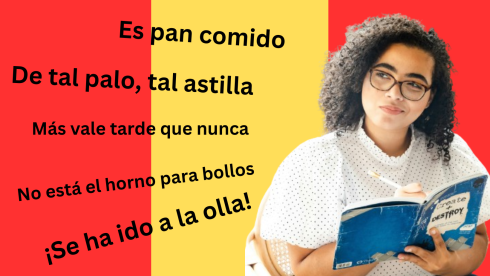Want to improve your Spanish? Here’s 10 idioms that will take you from beginner to pro in no time.

De tal palo, tal astilla
Directly translating to ‘from that stick, that splinter’, our closest equivalent to this phrase is ‘like father, like son’. This idiom has many other variations, but our favourites include: de padres gatos, hijos michinos (from cat parents, kitten kids) and cual el cuervo, tal el huevo (like crow, like egg).
A lo hecho, pecho
This one is certainly more inventive than its English equivalent, ‘what’s done is done’, directly translating to ‘take what’s done to the chest’. But don’t confuse this phrase with ‘tomarse algo a pecho’, meaning ‘take something to heart’.
A rey muerto, rey puesto
Meaning ‘out with the old, in with the new’, this idiom allegedly comes from Felipe V, who uttered the refrain when urged to take cover from enemy fire. It is also used to say ‘the king is dead, long live the king!’.
A quien madruga, Dios le ayuda
‘God helps those who rise early’ is the direct translation for this Spanish phrase, better understood as ‘the early bird catches the worm’.
Más vale tarde que nunca
Much like its English equivalent, this idiom translates to ‘better late than never’. So now you know what to say when your next appointment is running on so-called ‘Spanish time’.
Ojo por ojo, diente por diente
An ‘eye for an eye leaves the whole world blind’, said Ghandi. But that doesn’t seem to matter to both English and Spanish speakers, who both use the phrase ‘an eye for an eye, a tooth for a tooth’ when talking about justice.
No está el horno para bollos
The origin of this refrain, ‘it’s not the oven for buns’, is thought to be some sort of baking disaster, but today the idiom is widely used to say it’s not the right moment for something.
Tengo la mosca detras de la oreja
Have you ever imagined a little fly in your ear telling you when someone’s being suspicious? No? Me neither. But that hasn’t stopped Spaniards using this phrase, directly translated as ‘I have the fly behind my ear’ to say something isn’t right. The best English equivalent is the equally strange ‘I smell a rat’.
Ser pan comido
You know that feeling when you tick something easy off your to-do list? You might sit back and say ‘that was a piece of cake!’ Well, the Spanish equivalent isn’t quite as tasty. Translating to ‘to be eaten bread’, this idiom means to do a very easy task.
Irse a la olla
Directly translating to ‘to go to the pan’, this phrase is commonly used in place of ‘to lose your marbles’ or ‘go off your trolley’ to say someone has gone mad.
READ MORE:
- From ‘guiri’ to ‘gilipollas’: These 20 Spanish insults will have you speaking like a local – but how many do YOU know?
- Going native: How to improve your Spanish and what to look for in a language course
- Twenty signs you’ve become well and truly Spanish








